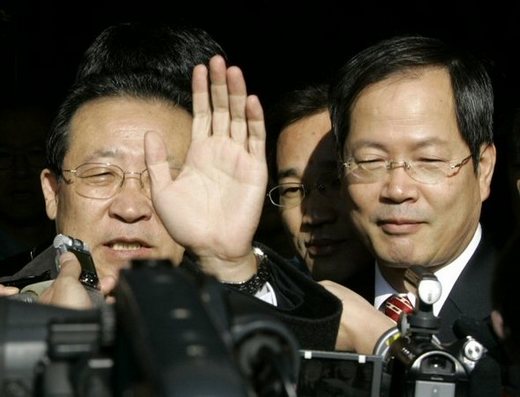 |
|
North Korea's vice foreign minister Kim Kye-gwan (left), and South Korean nuclear negotiator Chun Yung-woo (right) are surrounded by reporters in Beijing on November 30 following their meeting. (AP Yonhap)
|
APEC sideline talks, 2-day powwow in Beijing focus on sanctions, freezing of nuclear program
In his summit talks with South Korean counterpart Roh Moo-hyun, U.S President George W. Bush reportedly expressed willingness to sign a document declaring an end to the Korean War should Pyongyang give up its nuclear ambitions, according to diplomatic sources on November 29.
The Korean War ended in a ceasefire in 1953; the Korean peninsula remains technically in a state of war. An official peace treaty would replace the current, tenuous truce agreement.
During summit talks held on the sidelines of the APEC meeting in Vietnam on November 18, Bush made these comments in the process of explaining his already reported wording that the U.S. intends to grant economic incentives to the North and push to build peace on the Korean peninsula if the North abandons its nuclear ambitions, the sources added.
Along with this, Bush also reportedly gave a special order for his top North Korea envoy Christopher Hill to double up efforts to make headway in negotiations designed to deal with the communist country's nuclear issue.
The remarks come as Hill and his North Korean counterpart Kim Kye-gwan held two days of talks in Beijing, discussing Pyongyang's nuclear matter. During the two-day talks, held November 28-29, Hill called for the North to freeze its nuclear activities as a first step toward dismantling its nuclear bombs and giving up its nuclear program before the U.S. gives the North any security guarantees. He also expressed Washington's intention to resume the provision of oil for energy purposes once Pyongyang allows nuclear inspection by the IAEA, according to sources familiar with the matter. In response, Kim reportedly called on Washington to help lift a freeze on its assets at the Macau-based Banco Delta Asia (BDA), not elaborating on the communist nation's stance regarding Hill's proposals. North Korean assets at BDA were frozen following Washington's September 2005 naming of the bank as holding North Korean accounts of suspicious origin. Shortly afterward, the six-party talks dissolved into stalemate for over a year. Regarding the BDA issue, both nations confirmed they held a different stance, with Washington suggesting working-level talks at a later date to deal with the matter and Pyongyang sticking to its demand for the unfreezing of its assets. China, the host of the six-party talks aimed at dismantling North Korea's nuclear weapons program, encouraged both nations to find common ground, to simultaneously implement each other's demand for suspension of nuclear activities and subsequent provision of oil for power. In addition, Beijing reportedly expressed support for the establishment of a liaison office between the U.S. and North Korea, the removal of Pyongyang from Washington's list of terrorism-sponsoring countries, and the start of talks on human rights issues, diplomatic sources said. Due to the prolonged one-on-one negotiations with the North Korea's top nuclear envoy, Government officials said Hill cancelled his planned trip to South Korea to have talks with South Korean deputy foreign minister Yu Myung-hwan on November 30. Meanwhile, countries involving the six-party talks are aiming to resume the multilateral disarmament talks during the third week of next month, but diplomatic sources say that the talks may start a week later than that timetable. Please direct questions or comments to [englishhani@hani.co.kr]






